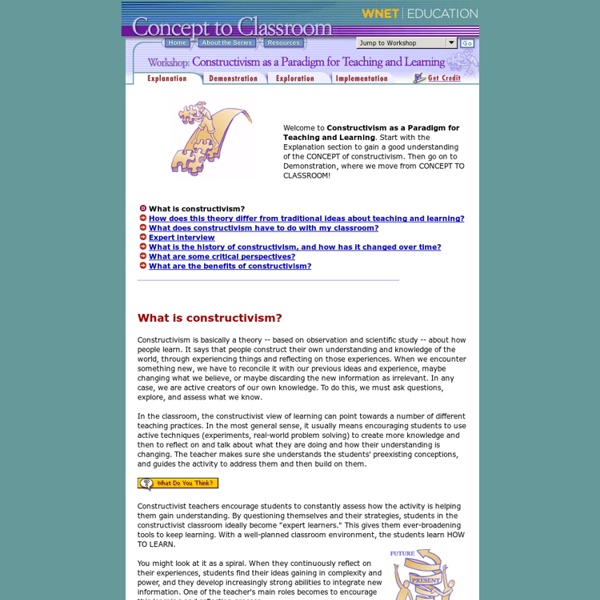Constructivist Learning
Constructivist Learning by Dimitrios Thanasoulas, Greece Only by wrestling with the conditions of the problem at hand, seeking and finding his own solution (not in isolation but in correspondence with the teacher and other pupils) does one learn. ~ John Dewey, How We Think, 1910 ~ As a philosophy of learning, constructivism can be traced to the eighteenth century and the work of the philosopher Giambattista Vico, who maintained that humans can understand only what they have themselves constructed. Within the constructivist paradigm, the accent is on the learner rather than the teacher. If a student is able to perform in a problem solving situation, a meaningful learning should then occur because he has constructed an interpretation of how things work using preexisting structures. personal involvement; learner-initiation; evaluation by learner; and (see
The Art of Teaching Science - Student Resources
Reprinted with permission from Feynman, R. P. September. "I would like to say a word or two about words and definitions, because it is necessary to learn the words. In order to talk to each other, we have to have words and that's all right. To make my point still clearer, I shall pick out a certain science book to criticize unfavorably, which is unfair, because I am sure that with little ingenuity, I can find equally unfavorable things to say about others. There is a first-grade science book that, in the first lesson of the first grade, begins in an unfortunate manner to teach science, because it starts off on the wrong idea of what science is. I thought at first the authors getting ready to tell what science was going to be about: physics, biology, and chemistry. Now energy is a very subtle concept. Look at it this way. Suppose a student says, "I don't think energy makes it move." I finally figured out a way to test whether you have taught an idea or you have only taught a definition.
Constructivism Learning Theory
Constructivism Learning Theory Constructivism learning theory is a philosophy which enhances students' logical and conceptual growth. The underlying concept within the constructivism learning theory is the role which experiences-or connections with the adjoining atmosphere-play in student education. The constructivism learning theory argues that people produce knowledge and form meaning based upon their experiences. Two of the key concepts within the constructivism learning theory which create the construction of an individual's new knowledge are accommodation and assimilation. The role of teachers is very important within the constructivism learning theory. Instead of having the students relying on someone else's information and accepting it as truth, the constructivism learning theory supports that students should be exposed to data, primary sources, and the ability to interact with other students so that they can learn from the incorporation of their experiences. Constructivism Basics
Instructional or Learning Design
Constructivism is a learning theory, not an instructional approach, hence it can best be thought of as a way of "growing" or improving instruction. It is greatly influenced by Piagetian (1950) epistemology and Lev Vygotsky's (1978) Zone of Proximal Development (ZPD) — knowledge (new connections) are products of the activities practiced in a social environment. Constructivists place the learner at the center of the equation; the idea is that the learner constructs knowledge rather than passively absorbing it. In some classrooms, the predominant training model is direct instruction, which is called instructivism or objectivism (based on information processing theory). However, in today's real-world context, the work environment is becoming a learning environment (learning organization). Both constructivism and instructivism are required as learners need to be able to solve complex problems and be able to understand the reasons or methods they use to reach their conclusions. 1. 2. 3. 4.
Harvard Wants to Know: How Does the Act of Making Shape Kids’ Brains?
Big Ideas Culture Design Thinking Teaching Strategies A group of Harvard researchers is teaming up with schools in Oakland, Calif. to explore how kids learn through making. Through an initiative called Project Zero, they’re investigating the theory that kids learn best when they’re actively engaged in designing and creating projects to explore concepts. Though it’s still in very early stages — just launched at the beginning of this school year — researchers and educators at the school want to know how kids learn by tinkering – fooling around with something until one understands how it works. To do that, they are working with both private and public schools in Oakland, headed by the Harvard researchers and 15 participating teachers who meet in study groups every six weeks to share ideas and to form a community. “It’s not a lesson plan; it’s not a curriculum; it’s a way to look at the world.” Project Zero is also asking teachers to look at student work differently. Related



